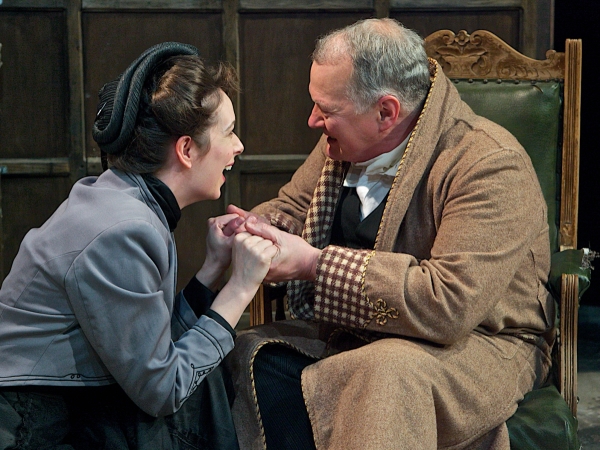The Last of the De Mullins (Jermyn Street Theatre)
St John Hankin’s rarely-seen play centres on a single mother who returns to her conventional Edwardian family

© Francis Loney
As Britain rushed headlong into the 20th century, massive social change was on the way, not least the position of women in society. The Last of the De Mullins explores what happens when a woman goes against the morality of the times.
Charlotte Powell's Janet de Mullin, the self-described 'abandoned woman', is full of fire and more than a little venom. She's torn between her new life in London and wanting to restore links with her family, the estate-owning De Mullins. Following a brief affair with Army officer Monty Bulstead (Benjamin Fisher), Janet runs away to London to give birth in anonymity and establish herself as a widow and milliner.
Nine years later, she returns to the family home when her father becomes dangerously ill. Stuart Organ's Mr De Mullin (looking in robust health) is initially delighted that his daughter has returned, but reverts to tyrannical Victorian father when Janet refuses to stay and allow the boy to be adopted by him, to become the last of the De Mullins of the title. Janet has shamed the family, as much as for being 'in trade' as for having a child out of wedlock.
The sub-plot of the flirtation between Janet's younger sister, Hester (played with charming reserve by Maya Masowicz) and Mr Brown (Nick Blakeley), the gawky verger, brings out Janet's mean side, telling her sister that only women who have brains and £500 can hope to be independent and successful. Other women should just get married. It's a nasty moment that makes Janet sound smug and cruel.
Hankin frequently poses the question, 'What do the upper classes achieve?' and answers 'Not a lot'. The wonderful Mrs Clouston (a caustically spot-on performance by Harriet Thorpe which provides most of the humour of the piece) represents the status quo, proclaiming that a woman can only be truly independent when she's dependent on a husband. Roberta Taylor's Mrs De Mullin is the down-trodden and dejected product of that overbearing dependence.
Although St John Hankin was considered by George Bernard Shaw to be "a most gifted writer of high comedy", this piece doesn't quite match that lofty description. It is, though, an interesting delve into Victorian society with its entrenched class system, its patriarchy, and the conflict of the new. Well worth seeing for the strength of its cast.












